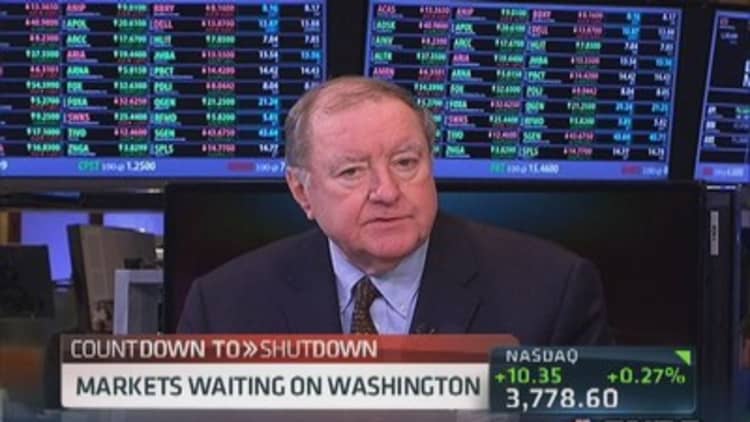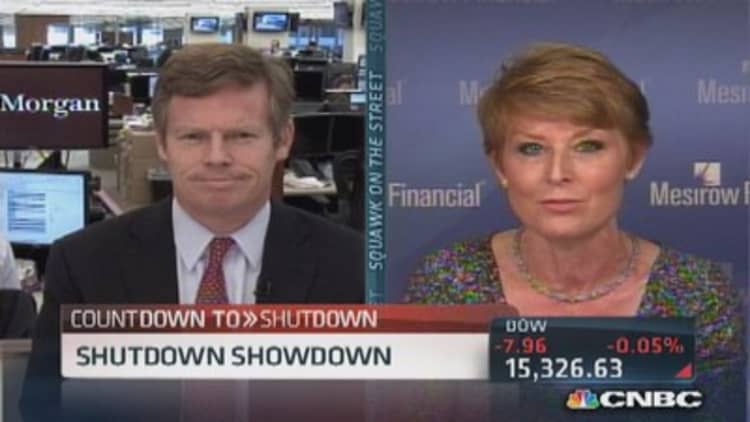As Congress squabbles over federal spending, Wall Street is increasingly fretting that the anticipated economic rebound is not materializing.
Wednesday's selloff following a report on Wal-Mart slashing orders was a good example of how worried traders are that the economic data is not pointing to a faster growth pace. Traders were already on edge after the Fed last week kept its easing policy in place, signaling that it, too, has concerns about the economy.
Wal-Mart stock, other retailers and the overall market fell after Bloomberg reported that Wal-Mart is cutting orders — but not across the board. Bond yields fell to their lows of the day. Wal-Mart told CNBC, however, that the story was misleading and that it was not cutting orders because inventories were piling up. Wal-Mart spokesman David Tovar said the company has hundreds of inventory categories and it is constantly managing inventory levels based on consumer demand in different markets.

"The market is vulnerable to negative news. You have the market watching dysfunction in Washington in real-time, and it's been choppy and down five days in a row, and then you introduce a new catalyst with Wal-Mart and it represents a large part of the consumer," said Art Hogan of Lazard Capital Markets. The was off for a fifth day, its longest losing streak of the year. The S&P fell 4 points to 1692.
"It certainly is a reminder the consumer isn't as robust as it was in the second quarter," said Hogan. "We didn't have a robust back-to-school season, and that's usually a precursor to holiday shopping season."
Wal-Mart stock and the overall market recovered some losses after the Wal-Mart comment but the sour tone persisted, as many trading rooms were tuned into the activities in the Senate.
(Read more: Wal-Mart: Slashed orders report 'completely false')
There are some important economic reports Thursday, including jobless claims at 8:30 a.m. ET and the third look at second quarter GDP, which is expected to improve to 2.8 percent from 2.5 percent. Jobless claims are expected at 330,000 after last week's 309,000. Pending-home sales are expected to show a decline of 1.4 percent in August. Nike, another important measure of the consumer and a new Dow component, reports earnings after the bell.
While traders will be watching those reports, they are also watching Washington, where Sen. Ted Cruz, R-Texas, spoke for 21 hours against Obamacare. The Senate, however, moved on to advance legislation that would fund the government and avert a shutdown but not defund Obamacare, as the House bill would do. How the Senate and House come together has yet to be seen and must be resolved by the Monday midnight deadline.
(Read more: Defunding Obamacare is 'not in the cards': Corker)
The quarter end is also upon markets, and various Wall Street strategists have made predictions of how pension funds will maneuver by the close of markets Monday. UBS strategists forecast that defined pension plans should be significant sellers of stocks and buyers of fixed income. "We see $35-41 billion range for equity sales by pensions with US large cap share at $15-$18 billion, followed by US small cap with projected $8-10 billion sales," they wrote in a note.

The UBS strategists expect purchases of $19 to $22 billion of U.S. fixed income. The S&P 500 is up 5.4 percent for the quarter so far, and 3.7 percent for September. "Given that some pensions rebalance monthly and some quarterly, this combination of strong positive returns for stocks for both month and quarter has amplified the size of projected rebalancing flows," noted the UBS strategists.
David Ader, chief Treasury strategist at CRT Capital, said the bond market is getting support from quarter-end buying but also the action in Washington. "It remains as we get into this event, that there will be some better buying because of it, and we're aware of it," he said. "It's almost a side show to the big show ... and that's the theatrics and circus that's going on in Congress. That's keeping everyone on tenterhooks and very anxious."
Ader said some of the quarter-end demand for corporate debt has no doubt been met by the huge issuance.
(Read more: Lew to GOP: Government cash to run out on Oct. 17)
Chris Reich , senior analyst at Informa Global Markets said September is so far the biggest month ever for investment grade corporate debt—at $142.6 billion—thanks to Verizon's $49 billion offering. This week alone, there was $29.2 billion, with $17.3 billion of that going to market Wednesday.
Ader said the market is also watching each data point, and durable goods Wednesday was disappointing, as were new home sales.
"We're seeing some things that are taking us away from the middle-of-the-year recovery story," he said. "We're back to a much more subdued view. The Fed did not detract from it. …This past quarter is not 2-percent (growth)."
While political battles have been waged against Obamacare, Ader said the market is now focused on it, attempting to assess the economic impact as the Oct. 1 date approaches. "We've had all these discussions and now we're really thinking in terms of economic terms. Really, what it will cost."
—By CNBC's Patti Domm. Follow here on Twitter @pattidomm.


